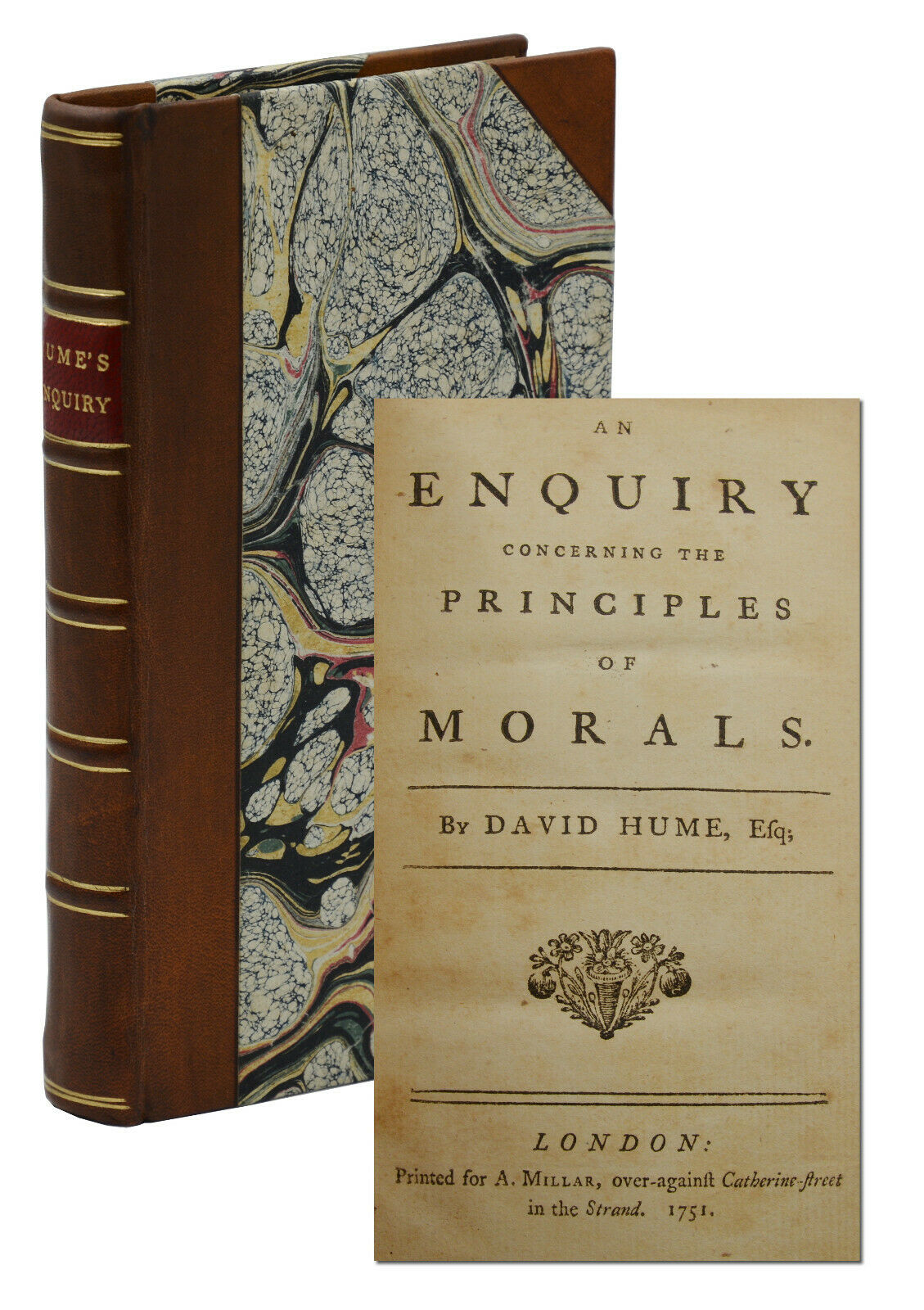Available Copies from Independent Booksellers

HUME, David. An Enquiry Concerning the Principles of Morals. A. Millar, London, 1751.
Price: US$5500.00 + shipping
Description: First state, with L3 uncancelled. 12mo (17cm). Contemporary brown sheep, with double gilt fillet around outer perimeter of boards, lacking spine label but with remnants of gilt tooling in second compartment; [viii],253,[3]pp. With half-title and errata. Ownership inscriptions of M. Jones, Marlborough 1750, to halftitle, and of B. F. Voss to front and rear endpapers. Sewing sound, but hinges cracked (though cords are holding); rubbing and wear to boards, especially lower front corner; mild foxing throughout: complete and Good. Hume wrote that of all his works, this was, "in my own opinion [.] incomparably the best" (ODNB). A series of connected essays on morals, reworking Book 3 of of his landmark Treatise of Human Nature, this title is often nicknamed the "second Enquiry" (the first being Hume's Enquiry Concerning Human Understanding). "He redesigned his treatment of morals to concentrate on the virtues of benevolence and justice, and on the argument that the standard of moral judgement is to be found in the principles of utility and agreeableness" (ODNB). This title was "markedly less provocative.than its counterpart" on the separation of morals from religion. A major work of Scottish Enlightenment philosophy, in a contemporary binding. ROTHSCHILD 1174.
Seller: Lorne Bair Rare Books, ABAA, Winchester, VA, U.S.A.

Hume, David. An Enquiry Concerning the Principles of Morals. A. Millar, London, 1751.
Price: US$5774.69 + shipping
Condition: Very Good
Description: 12mo. Pp 253. Half title (with early signature). With the uncancelled leaf L3. Errata leaf following title page and with the publisher's list at end. Coeval full calf, uniform but not displeasing wear/rubbing. Hinges secure. Lacks front free endpaper. Lacks title label to spine.
Seller: Leakey's Bookshop Ltd., Inverness, United Kingdom

Hume, David. An Enquiry Concerning the Principles of Morals. Printed for A. Millar, London, 1751.
Price: US$8500.00 + shipping
Condition: Near Fine
Description: First edition, first printing. Correct first issue with Leaf L3 uncancelled. Bound in recent half leather with marbled paper-covered boards; with front and rear blanks, half-title page, preliminary errata, three final pages of adverts. Near Fine. Contents toned, previous owner name to contents page. A cornerstone of modern philosophy and ethics, providing an analysis of moral theory and justice.
Seller: Burnside Rare Books, ABAA, Portland, OR, U.S.A.

HUME, David. Enquiry concerning the Principles of Morals. Printed for A. Millar, London, 1751.
Price: US$8500.00 + shipping
Description: An Enquiry Concerning the Principles of Morals. Printed for A. Millar, London: 1751. First edition, first issue, with L3 in the uncancelled state with the catchword "than". Twelvemo (6 1/2 x 3 7/8 inches; 166 x 100 mm). [viii], 253, [3 ads] pp. With errata leaf. Early nineteenth century half calf over marbled boards. Rebacked to style. Red morocco spine label, lettered in gilt. Top edge dyed brown. Page 19 with paper-flaw, affecting a few letters. A repair of a closed tear to the top of page 119, touching some letters, but with no loss. Closed tear two leaves, pp 193-196, touching a couple of letters, but with no loss. Overall a very good copy. Hume wrote of the Enquiry: "of all my writings.incomparably the best. It came unnoticed and unobserved into the world" (Autobiography, p. 16, quoted in Rothschild). "Soon after leaving Edinburgh University at the age of 15, [Hume (1711- 1776)]. embarked on a course of intense study of his own devising, which eventually led to the formulation of a complete philosophical system, published anonymously in 1739 as A Treatise of Human Nature. Hume was deeply disappointed at the reception of his revolutionary book.Blaming his own literary inexperience, Hume published anonymously in 1740 An Abstract of a Treatise of Human Nature and in 1748 and 1751 respectively Philosophical Essays concerning the Human Understanding and An Enquiry concerning the Principles of Morals. Philosophical Essays was retitled An Enquiry concerning the Human Understanding in a 1758 edition.In his advertisement to a later edition of the two Enquiries, Hume expressly desired that they and not the Treatise should be âregarded as containing his philosophical sentiments and principles.' The Enquiries differ from the Treatise in style, in the omission of a number of elaborate psychological speculations, particularly concerning space, time, and sense perception, and in the inclusion of chapters on miracles, providence, and the theological implications of the free-will problem, all of which Hume had omitted from the Treatise because of their openly antireligious tendency" (The Encyclopedia of Philosophy). Jessop, p. 22. Rothschild 1174. HBS 68396. $8,500.
Seller: Heritage Book Shop, ABAA, Beverly Hills, CA, U.S.A.

Hume, David. An Enquiry Concerning the Principles of Morals.. Printed for A. Millar, London, 1751.
Price: US$11000.00 + shipping
Description: First edition, first state of what Hume, himself, considered his masterpiece with leaf L3 uncancelled and with the catchword "than" on recto. Octavo, bound in full contemporary calf with five raised bands to the spine, burgundy morocco spine label lettered in gilt, gilt-turn ins. Half-title, errata, and advertisements at rear. In very good condition. Ownership signature. Housed in a custom folding chemise slipcase. Exceptionally clean internally, most rare and desirable bound in a contemporary binding. Humeâs Treatise of Human Nature (1739-40) was the first attempt to apply principles of Lockeâs empirical psychology to a theory of knowledge. In this and his Enquiry Concerning the Principles of Morals, Hume stands as a leading voice in the school of Utilitarianism, âthe most influential and longest continuing tradition in English speaking moral philosophy⦠marked by a long line of brilliant writersâ that includes Adam Smith, Jeremy Bentham and John Stuart Mill. Humeâs Enquiry importantly explores âhow we make moral judgments⦠the âmechanismâ of moral judgments. How are they made and what accounts for their content? Hume aims to be the âNewton of the Passions.â In contrast to Locke, he does not present a normative system of principles founded on the Laws of Nature⦠[but] the role it plays in social life and in establishing social unity and mutual understanding⦠What Hume is trying to do is explain the fact that we agree⦠On Humeâs view there is only one possible basis, and that is one that appeals to our principle of humanity⦠the psychological tendency we have to identify with the interests and concerns of others when our own interests do not come into competition with themâ (Rawls 162, 177-87). An Enquiry was, in Humeâs own opinion, âOf all my writings incomparably the bestâ (Autobiography). The influence of Utilitarianism as furthered by Hume was immense: âHe may be regarded as the acutest thinker in Great Britain of the 18th centuryâ (DNB).
Seller: Raptis Rare Books, Palm Beach, FL, U.S.A.